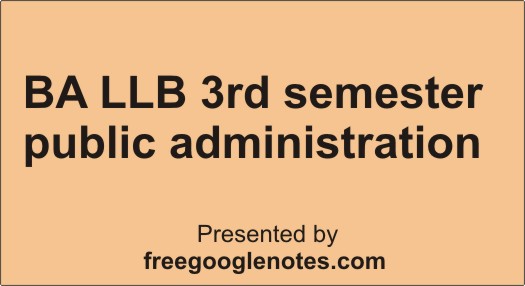integration is paramount ,the proliferationof functional specialists in administration will add to the many centrifugal forces that already exist “When a society is rent by all sorts of social and political forces pulling
in conflicting, disintegrative directions, the administrative generalist may
be a vital cement holding the system together.” He admits the need for
functional expertise in administration for economic development but
doubts if economic modernization could evolve without administrative
generalists. He cautions that “there must be accorded equal attention
to the critical political role that the administrative generalist can
as well as to the need for preventing these generalists from impeding
the development of countervailing centres of political power.”
Joseph La Palombara fears that enhanced importance and power
of the specialists might create the problem of control over bureaucracy
and ultimately endanger democratic development. He argues that
proliferațing these specialist bureaucrats early in the histories of the
developing states may serve to tip the political balance permanently in
favour of a bureaucratic elite. If the specialists in destruction, the
military, often enjoy a position of superior power that is precisely
because they are technologically the most ‘modern’element in the
developing states. He cautions that if the new states are going to
emphasise functional expertise in public administration, they should be
clear regarding the possible political price that such a programme may
imply.” Palombara argues that the pressure to proliferate the functional
specialists in administration will bear a direct relationship to the degree
in which government becomes involved in technical activities. He refers
to the dilemma faced by the developing countries wherein the national
goal of industrialization may require a very high degree of differentiation
of administrative roles. “Great differentiation does not seem to be a
requisite of political democracy.” One of the great dilemmas of many
of the developing countries is that they seem to want economic
development more than freedom.”
Fritz Morstein Marx thinks that the growth of functional expertise
in the bureaucracy seriously weakens the integrative function of the
generalist administrators. “Functional expertise, rushing into the public
embodiment of an integrated administrative branch. The specialist was
insular in his outlook. He mastered the techniques of his own methodology. goverment dissolved into a maze or tunnels
each inhabited by a separate class of technicians.” He argues that this
insularity and concern with limited interests blurs the bureaucrat’s vision
of the broader national problems and reduces his capacity to fulfill his
vital role as a policy advisor. The knowledge of the whole organisation
becomes a casualty. The political mind and the administrative mind
frequently lose sight of each other.
Finally, he says that functional expertise is a destroyer of exprit
de corps. According to him, specialist groups are not “the bureaucracy”
though nominally part of it.
The Possible Alternative
As described above, the British and the American models are
two ends of the pole. Each of these requires more re-organisation and
modifications. In the U.S. system there is emphasis on over specialisation.
The problem there is how to bridge the wide gap between the strong
specialisation of the career civil service and the broad requirements of
executive management. Realising this the second Hoover Commission
suggested the creation of a Senior Civil Service which took shape in
1978 in the form of Senior Executive Service. The idea behind its
creation was the desire for managerial flexibility and executive
leadership. The service facilitates the transfer of senior executive service
from position to position and from agency to agency. “The S.E.S. is
the blending of both the technocrats and the general administrators.”
This indicates new trends in American civil service.
In Britain, the system has responded to modern pressures, (a)
through increasing the discretionary authority of administrators ; (b)
through increasing the dependence of administrators upon various forms
of expert advice ; (c) top specialist advisers have gained easier access
to ministers; and (d) a number of policy posts have become filled by
specialists. Moreover as a result of the Fulton recommendations various
classes of civil servants have been aggregated into still larger blocks.
Also “integrated hierarchies” of generalists and specialists have been
established in some departments like the Ministry of Transport and the
Department of Trade and Industry. But despite these developments in
the departments, and the Fulton integration of senior management posts,
“the basic division between generalists and specialists remain firmly
rooted in (British) civil service methods of recruitment, training and function.
We conclude the discussion by supporting the observations of
Peter Self on the subject. He is of the opinion that the distinction
between ‘generalists’ and ‘specialists’ is plainly outmoded at higher
organisational levels. “In all systems, the problem is to secure official
who can perform creditably either as a specialised generalists or
educational background to detailed knowledge of some
generalised specialist. The former individual must move from broad
administrative
intellectual knowledge to proficiency in the skills of organisation and
policy making.” In France, a broad differentiation of specialised
generalists and generalised specialists is set right from the beginning.
It is supplemented by appropriate training, and carries through in
separate but interweaving streams to the higher positions of the service.
In India’also it has been decided to introduce some specialisation
for the I.A.S. and allied services. A freshly appointed I.A.S. officer will
have not more than three postings in the first 11 years of his service
(including two years of probation period. The postings would be in
field, regulatory departments (like home, law, enforcement organisations
and general administration) and welfare departments (education and
health, and family welfare). They are also expected to acquire a
reasonable experience in departments dealing with finance and
commercial matters and in public sector undertakings. Most of the
officers are supposed to work for about a decade in the state where
only they could get this experience. The officers in this top echelon of
administration will be given a chance to specialise in a branch of their
preference between the 11th and 16th years of their service.


